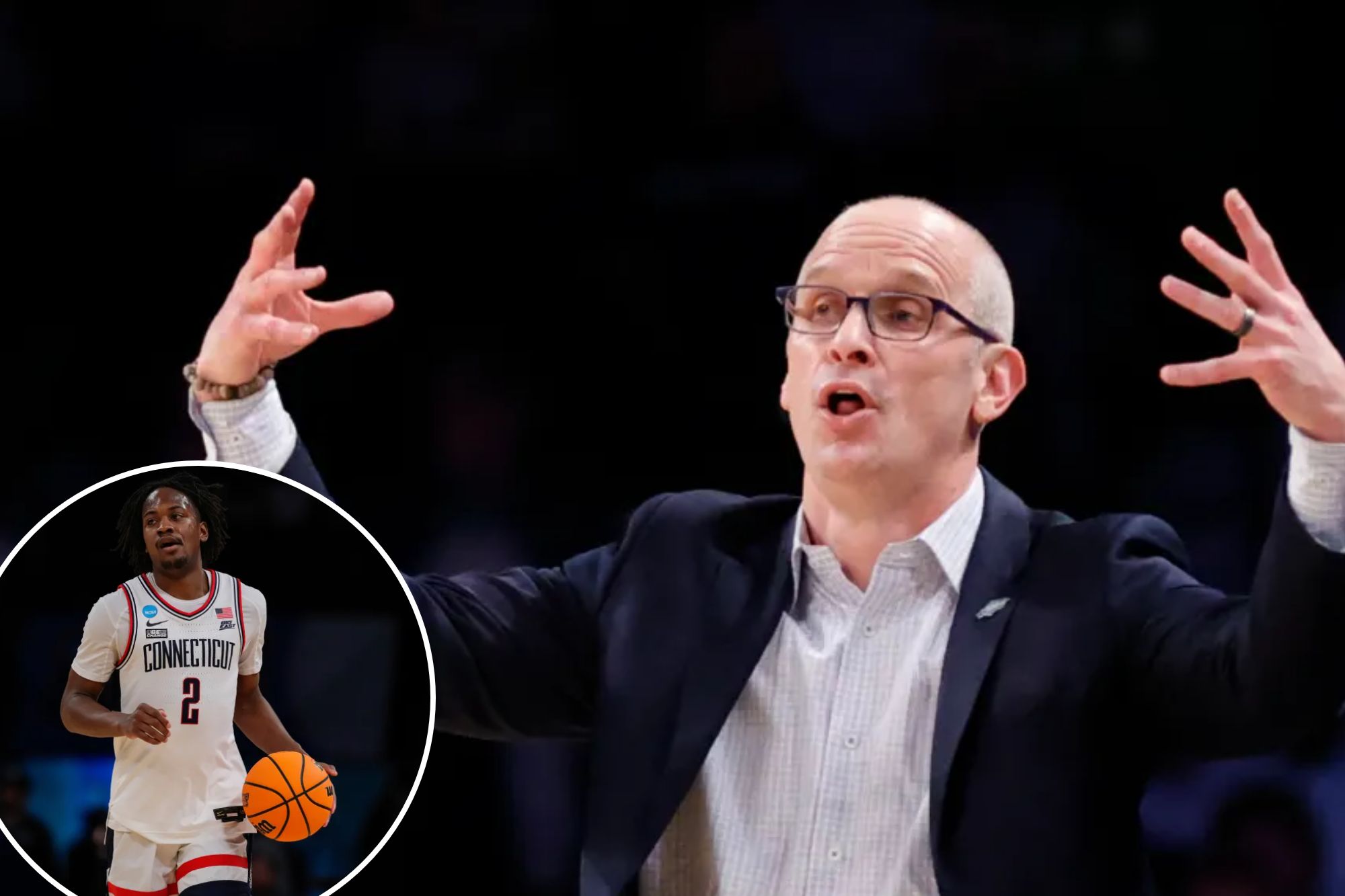
No one is immune. It can happen to anyone.
All year long, Dan Hurley has drilled that message into the heads of his UConn Huskies, that it can happen to them, that anything less than 40 Minutes of Husky Hell can send you home, can send you home with regret, that you will have only yourselves to blame for failing to become the first repeat champion since Billy Donovan’s Florida in 2006 and 2007.
James Madison … Grand Canyon … Oakland … maddening March reminders for Hurley of the inherent dangers that lurk everywhere. It is why, with ninth-seeded Northwestern up next Sunday night at Barclays Center on Repeat Road in the East Region, he remains maniacally unyielding and unwavering every second of every day, every possession of every game, why he never stops being the exterminator of complacency.
Hurley has studied how The Great Coach handles the insidious disease that is complacency.
“I read. I’m constantly listening to podcasts and reading about great leaders,” he said. “You know, the Nick Sabans, the greatest coaches, the John Woodens, the Bill Parcells, Bill Belichick, anything that I can read or listen to or go and visit and watch.”
He had a bird’s-eye view how his father, legendary St. Anthony High School coach Bob Hurley, refused to allow complacency to survive and advance.
“He handled complacency with a constant intensity and a consistent intensity,” Hurley said, “and he modeled just a work ethic and a commitment of just pouring everything that he had of himself into his job or into his lifestyle as a coach. I think what you see from every coach, or at least the best ones, is that you can tell that they are — emotionally, physically, mentally, they pour everything they have into their team, their preparation, rooting out any types of behaviors or habits they believe could potentially undermine the success of an organization or the championship success of an organization.”
Northwestern Coach Chris Collins played for legendary Duke coach Mike Krzyzewski from 1992-96, and coached under him from 2000-13 when Coach K won his third and fourth titles in 2001 and 2010. Collins has never forgotten how The Great Coach slam dunks complacency.
“Coach was always so good mentally with our teams,” Collins said. “I thought he was as good as it got with always creating motivation — not year-to-year motivation, but day-to-day motivation. Ways to keep our team on their toes. Ways to make sure guys were not in a position to ever get complacent about anything, especially if they had won a lot. We had been on winning streaks, championships, whatever it may be.
“He had an amazing ability because of his fire and competitive nature to really draw that in to us as players where the moment you relax for one second, he was going to be all over that and make sure that we got back to being the team we needed to be. There’s probably not a day that goes by that something I do doesn’t relate to something he did with one of our players at Duke in terms of motivating or building teams.”
Duke coach Jon Scheyer, who draws James Madison on Sunday night, played for Coach K from 2006-10 and coached alongside him from 2014-22, when Coach K won his fifth national championship in 2015.
“I could have a whole list of all the different things that he would do,” Scheyer said. “I think the brilliance of Coach K, what he’s always done is he would never handle a situation the same. If he didn’t feel like you were not as good as you should be, he may handle it differently for you versus somebody else, and that’s the brilliance of him. The motivation behind every game, every team, every player, no one thing was the same, I think that’s what made him so special … being able to push the right buttons at different times. He would do all different things all the time.”
This was John Wooden, who won 10 national titles at UCLA and seven in a row from 1967-73: “The infection of success is often fatal. Most people work harder on the way to the top than when they arrive. If you’re fortunate enough to get there, do not be swayed. Allow success to turn your head and you’ll be looking failure right in the face.”
And: “I tried to teach today is the only day in which you have control and what happened yesterday will not have any control over what happens today, except learning from it.”
The essence of Hurley’s greatness: this team is every bit as hungry to maintain as last year’s team was to achieve.
“You can’t get complacent,” Tristen Newton said, “when you’re trying to go for an historic thing.”
The Joy of Six championships drives Hurley, and drives his players. It’s the only expectation at UConn now. He leaves no stone unturned. Ever. Winning isn’t everything but it’s the only thing, right?
“We’re just as hungry because we want to experience that feeling of winning again,” Alex Karaban said, “but more importantly we want to experience with the new guys, too, because they haven’t felt what it feels like to win a national championship.”
Cam Spencer didn’t experience the Drive to Five. He entered the transfer portal from Rutgers. He takes it as a compliment that his mentality has been compared to Hurley’s. “I’d go to war for him any day of the week,” Spencer said, “and I think we all would.”
Collins tries now to take Northwestern to its first Sweet 16. Northwestern wants to make history too.
“They are as dangerous an opponent as you can face at this point in the tournament,” Hurley said.
For Dan Hurley and for UConn, complacency can go to hell.














